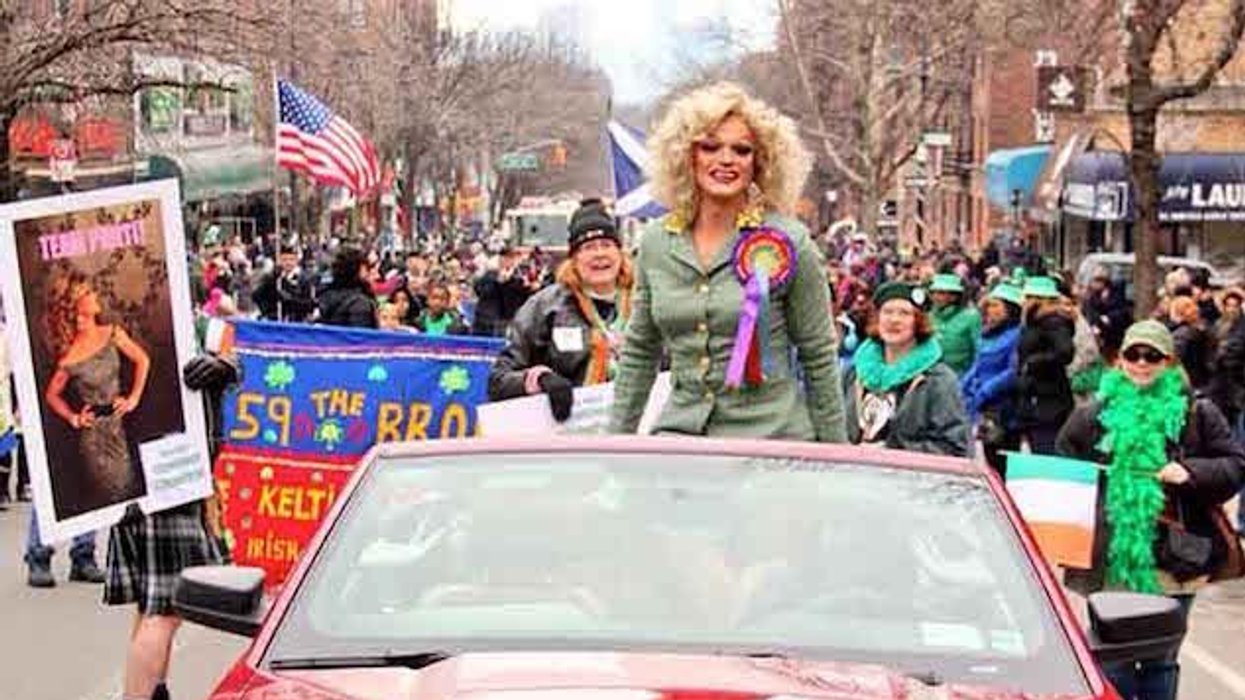
On May 22, Ireland will become the first country in the world to put same-sex marriage to a popular vote.
March 16 2015 9:52 AM EST
May 26 2023 4:13 PM EST
By continuing to use our site, you agree to our Private Policy and Terms of Use.

Panti at the 2014 St Patrick's Day Parade in Queens, New York | Photo by: Cahir O'Doherty
Pandora Panti Bliss, the drag persona of Rory O’Neill, has long been a staple of Ireland’s gay community. Proprietress of Panti Bar, a popular gay spot on Capel Street in Dublin, just across the river from Temple Bar, O’Neill has been visible on the Irish scene entertaining and promoting LGBT rights for decades. This past year, however, Panti’s face has been beamed and streamed across the globe as she’s taken up the helm of Ireland’s fight for marriage equality.
On May 22, Ireland will become the first country in the world to put same-sex marriage to a popular vote (Switzerland legalized registered partnerships in 2007 in a similar fashion, but has yet to decide on marriage). Marriage equality has been sweeping east across Europe, and Ireland could become the last Atlantic-lying country to extend the right. There had been talk of holding a referendum on the issue for a number of years, but discussions took on a much more concrete nature in response to an incident that has come to be known as the Panti Gate Scandal.
In January 2014, O’Neill was asked to name homophobic people in Irish society on The Saturday Night Show. After calling out a number of prominent members of the religious Iona Institute, those named responded by threatening legal action. RTÉ, Ireland’s state-funded broadcasting network (the equivalent of the BBC in the UK), responded by paying out more than $100,000 in settlements. Rightly outraged at the state’s failure to protect his freedom of expression, O’Neill gave an impassioned 10-minute speech, the Noble Call Speech, at the Abbey Theatre in Dublin as Panti. The video, in which O’Neill recounts a life deeply affected by Ireland’s homophobic society, went viral, with the likes of Madonna, RuPaul, and Stephen Fry praising O’Neill’s eloquence.
With just over two months to go, there is reason to be optimistic. Every major political party supports marriage equality, and the Prime Minister, Enda Kenny, has announced that he will join the campaign to see it passed. Some polls have shown upwards of 80% of Irish voters supporting the move, a figure which rises to around 90% in students. Out spoke with O’Neill in the early days of campaigning. He talked about Ireland’s gay history, his role in the referendum debate, and his cautious optimism that the Irish people will vote to support the humanity of their neighbors this May.
I interviewed O'Neill, and among other things, we also wanted to know what it meant for the rest of the UK and Northern Ireland, in particular.
OT: Has anybody speculated what a successful vote might mean for Northern Ireland [the last part of the United Kingdom without same-sex marriage]?
Rory O'Neill (a.k.a. Panti): I think that would put even more pressure on Northern Ireland. I mean, Northern Ireland would become this tiny little hold out between the U.K. and Ireland, this tiny sort of medieval bloc. Sinn Feín, the republican party here, who have long been associated with the IRA, oddly have always been very pro gay rights, because they come from a very socialist background. Sinn Feín are a major player up north as well, so if marriage equality comes in here, I couldn't image Northern Ireland holding out for much longer.
To the outside world, Ireland is still thought of as a very conservative, very Catholic country, but that doesn’t match up with the apparent widespread support for LGBT rights.
I think a lot of that view of Ireland is just so outdated. It’s partly Ireland's doing, because we like to sell that—it’s good for tourism and all that. But Irish people living their day-to-day lives, they don't remember the last time they saw a bishop. I think, like in any country, the picture's more complex. So of course there are areas in which that sort of conservative Ireland still holds a lot of power, but it's becomng less and less.
Read the full interview here.
Exclusive: Lady Bunny releases new 'Hot To Blow' video